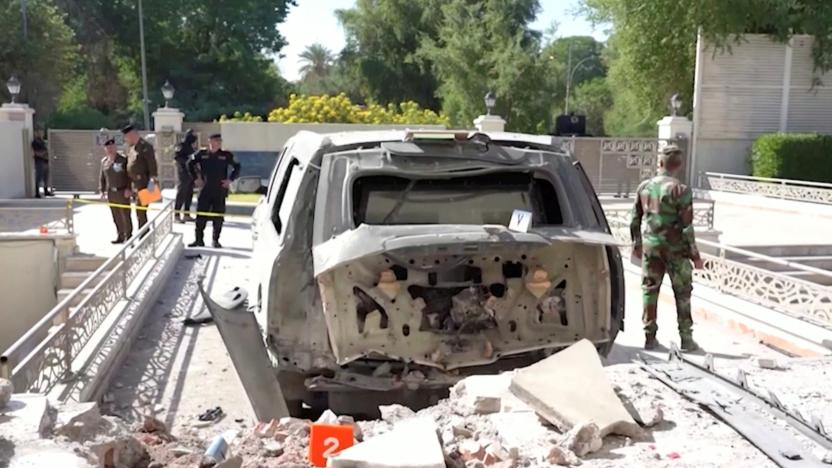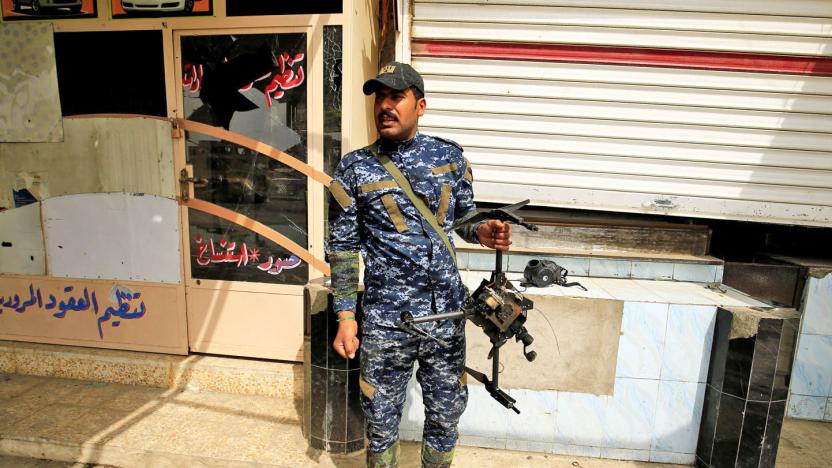Iraq
Latest

Iraqi prime minister says he was the target of a drone assassination attempt
Iraqi Prime Minister Mustafa al-Kadhimi said he was the target of a failed assassination attempt using drones.

US seizes Iranian websites over disinformation claims
The US government has seized 33 websites owned by the Iranian Islamic Radio and Television Union (IRTVU), as well as three other sites owned by Iraqi-based Kata’ib Hizballah (KH), after the groups violated US sanctions, the Department of Justice said in a statement yesterday.

Apple's App Store is coming to 20 more countries
Apple is planning the largest expansion of its App Store since 2012 by adding 20 new countries, according to an article on its developer portal. The company asked developers to log into their accounts to accept the latest license terms so their apps will be available in those regions. Apple didn't say when the rollout would begin, but it asked devs to update their info by no later than April 10th.

Burned alive for using a smartphone
This article was produced in partnership with Point, a YouTube channel for investigative journalism. Mosul, Iraq -- Before the camera rolls, 34-year-old Fatima pulls her head scarf over her face and ushers her young daughter out of frame. It can be hard to get people on camera in this city. They're happy to talk off the record, but as soon as a recorder comes out, they become skittish -- and with good reason. They're terrified that ISIS will eventually return and that they'll be first on the chopping block for talking to journalists about the brutality of the occupation.

Iraq reportedly ignored concerns over electronic voting machines
Iraq is learning first-hand about the potential pitfalls of electronic voting machines in the wake of its disputed May 12th national election. Reuters has discovered that the country's election commission ignored an audit board warning that the vote counting machines, provided by Miru Systems, were unsuitable and susceptible to tampering. The commission committed a "clear legal violation" by moving forward, according to the board.

Quika promises free satellite internet for developing countries
Facebook's plans for free satellite internet access may have run into some... setbacks, but another company is promising to make that ubiquitous data a practical reality. Quika, a company led by the chief of satellite provider Talia, is launching a free satellite broadband service in the second quarter of 2018. It's promising speedy, low-latency Ka-band data in developing countries where income inequality and a lack of infrastructure (especially in rural areas) make conventional internet access impractical for most. Service will begin with Afghanistan, Iraq and most of Africa, but there are promises of more countries afterward.

DJI grounded its drones in Iraq and Syria to lock out extremists
The most recognizable name in drones has reportedly stepped in to help the United States in its ongoing war on terror. As The Register reports today, Shenzhen-based DJI -- makers of the ever-popular Phantom and Inspire series quadcopters -- quietly created software-based no-fly zones over large parts of Iraq and Syria where ISIS fighters have been known to strap improvised bombs to commercial drones.

President Trump plans to order a new travel ban next week
President Donald Trump said he will sign an executive order next week that updates his contentious January 27th ban on travelers and refugees from seven majority-Muslim countries. Last week, a federal appeals court ruled to keep a stay on the president's travel ban, which has been openly opposed by leaders in the technology industry including Google and Facebook. The new executive order will address the legal pitfalls that have paused the first travel ban, Trump said at a press conference today. "The new order is going to be very much tailored to what I consider to be a very bad decision," he said. "But we can tailor the order to that decision and get just about everything, in some ways more, but we're tailoring it now to the decision."

ISIS has converted commercial drones into bombers
As Iraqi Security Forces attempt to drive ISIS out of Mosul, a large city in Northern Iraq that the terrorist organization has occupied since 2014, it's facing an arsenal of improvised, experimental weapons. One of ISIS' newest hand-made weapons is the armed drone: a commercial quadcopter equipped with the ability to drop grenade-size explosives.

Iraq built a gun-wielding robotic vehicle to take on ISIS
Iraq built an armed robotic vehicle, according to Baghdad Post, and it could be used to take back a town occupied by ISIS. Based on Defense One's translation of the story, the robot is car-sized and tank-like, equipped with an automatic machine gun and a rocket launcher. It also has four cameras to be able to show operators its field of view, since it's controlled using a laptop from a kilometer away. That distance means its operators still have to be on the battlefield, but at least they can stay hidden and safe while the machine does its job.

Iraqis use off-the-shelf drones to battle ISIS
Let's say you're leading an Iraqi militia. You want to reconnoiter ISIS fighters' positions, but you don't have the budget for military-grade UAVs or helicopters. What to do? For the Iraqis themselves, the answer is simple: buy everyday drones. As Wired notes, both Shia militias and Iraqi officials are using consumer drones bought in hobby and toy stores (like DJI's Phantom line) to observe ISIS positions and help call artillery strikes. They seldom last for more than 40 minutes in the air, but that's enough to provide a heads-up and improve accuracy.

Facebook is being used to sell weapons in the Middle East
Facebook's social network reaches billions of people around the world, but its tools aren't always used with the best intentions. The New York Times reports that Facebook Groups are being used to sell weapons in the Middle East. The sales violate Facebook's policy for selling goods on the site of course, but that's not stopping folks in Libya, Syria, Iraq and other countries from posting weapons commonly used by terrorists and militants for sale.

How seismographs can track battlefield bombings
A team of researchers from Washington University in St. Louis, led by Ghassan Aleqabi, recently stumbled upon a treasure trove of seismic data from a most unexpected source: an array of earthquake monitors installed in Iraq and originally used to keep tabs on Iran's nuclear tests. They also allow Iraqi universities to study small scale 'quakes. The 10 seismic monitoring stations were initially installed by the US, with Aleqabi's assistance, in 2005.

America's drone strike program needs a low-tech fix
Last week, The Intercept released a trove of classified documents (provided by an unnamed source) relating to America's use of unmanned aerial vehicles (UAVs) as weapons of assassination. These activities took place between 2011 and 2013, throughout both active combat areas in Iraq and Afghanistan and nations like Yemen and Pakistan. And while plenty of people are discussing the shortcomings of human-controlled UAVs, nobody's talking about how to fix them. Could the answer be more technology like the fully autonomous weapon and surveillance platforms that the Department of Defense (DoD) is developing? Or, when it comes to aerial assassinations, is less more?

Pentagon confirms Iraq drone crash that surfaced online
There are a lot of hoaxes on the internet, but if you see images of a drone that looks like the one above, lying motionless in the middle of the desert, then you can be sure those aren't fake. Pentagon has admitted to BuzzFeed that the pictures of a drone crash that recently started circulating on social media websites are real. Those photos were posted on Twitter by Iraqi journalist Steve Ishak, who told the publication that he got them from a follower who, in turn, got them from local villagers in the country's Samawa province. "We can confirm an MQ-1 crashed on its way to its recovery base in Iraq," military spokesperson Major Genieve David said, adding that the UAV malfunctioned due to "loss of communication."

Snowden documents reveal how the NSA searches voice calls
The Intercept has released a new document from Edward Snowden's cache of government files describing how the NSA has been converting voice calls to searchable text documents for nearly a decade. The NSA has long monitored signals intelligence (SIGNIT) around the world (as is its primary function), especially in active combat zones like Afghanistan and Iraq as well as in Latin America. Traditionally, this sort of data gathering required that a live operator listen in on calls and translate them in real-time. However, the NSA has reportedly developed what it calls "Google for Voice"; an automated system that provides a rough but keyword searchable transcription. According to the documents, the NSA has also developed analytical programs and sophisticated algorithms to flag conversations for human review.

Iraq blocks Twitter, Google, YouTube and Facebook in effort to stifle insurgency
The Iraqi government has essentially shut off all social networking in the country in an effort to stem the rising tide of insurgent group Isis (Islamic State of Iraq and the Levant). The country has found itself thrown into chaos recently as the Islamist militants have overrun the cities of Mosul, Falluja and Ramadi in a march towards Baghdad. Isis, like many of the rebellions in the region recently, has made heavy use of social media for both propaganda and organization. In particular the group has spread its hard line religious and anti-western message via YouTube. Presumably prime minister Nouri al-Maliki has had the services blocked in an effort to disrupt Isis's movement and planning, and perhaps give the government's troops an opportunity to strike back.

Microsoft lands an official software outlet in Iraq
Believe it or not, there hasn't been an official distributor for Microsoft software in Iraq in the near-decade since it's even been an option; if you wanted Windows or Office in the past several years, your choices were limited and seldom legal. Baghdad's Legend Lands is filling those big shoes through a deal with Microsoft that will see it provide both official copies, support, and other help for Iraqis that want to take the honest path. Stores across the country will take care of everything from large-scale government orders down to a Tikrit family's first home PC. The move won't completely quash piracy concerns, but it's a big step towards normalcy in technology for the desert nation. [Image credit: Shbab4ever]

Web Marketplace for Windows Phone gets 22 more stamps in its passport
If you've been holed up in Thailand, waiting to browse the latest and greatest apps for your Windows Phone in your browser instead of on the device directly, then things are looking up. Microsoft has just announced that 22 new countries are being graces with their own web Marketplace. The full list covers Bulgaria, Costa Rica, Croatia, Estonia, Iceland, Latvia, Lithuania, Romania, Slovakia, Slovenia, Turkey, Ukraine, Venezuela, UAE, Bahrain, Iraq, Saudi Arabia, Qatar, Kazakhstan, Israel, Thailand, and Vietnam. The same blog post advises that work is also underway to improve the search results delivered by the site. So you might not have to play Hungry Birds for much longer.

Iraq war veteran's iPod found 6,000 miles away, returned to him
You always hear about a lost cat or a dog traveling hundreds of miles to find its owner. Here's a story from WFMY2 News in Greensboro, NC about an iPod that traveled thousands of miles to make its way home to a soldier in Iraq. The story begins with Venice Curtis,who had an iPod that he used for music, to take photos and keep track of contacts while serving in the Middle East. He sent the device home to Louisiana, but it was lost in transit. Believing the device was gone, Curtis got a new one for Christmas. In the meantime, fourteen-year-old Dalton Williams was at Cone Hospital in Greensboro, North Carolina. Deep in the crack of a waiting room couch, he found an iPod. He reached down into the crevice, so small his hand could barely fit, and pulled out the device. Browsing through the iPod, he saw pictures of military helicopters and names of people with their ranks. After doing some sleuthing with his Dad, Williams found Venice Curtis, the iPod's rightful owner. The teenager sent the device back to Curtis, with a note thanking him for his service to our country. Curtis talked to News 2 and said he was thankful that Williams sent him his iPod back, but was more grateful for the heartfelt note.










